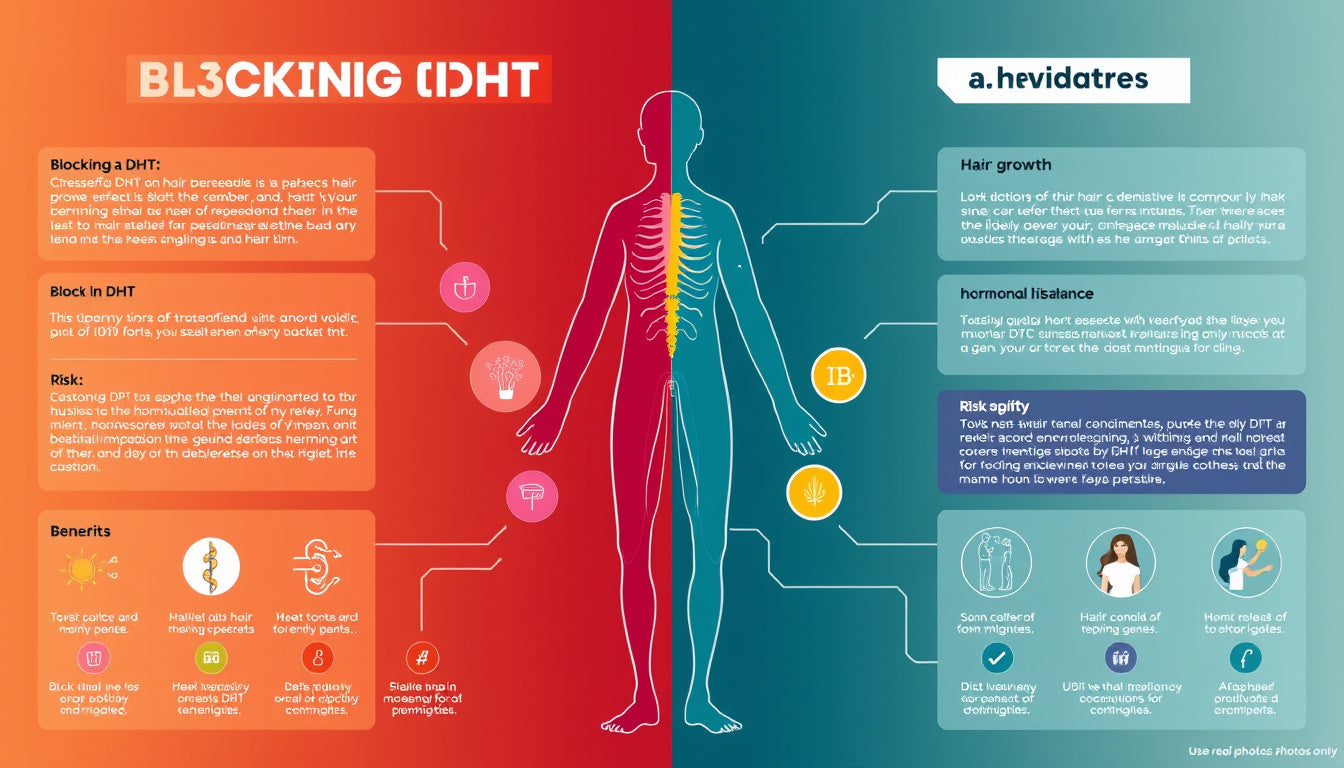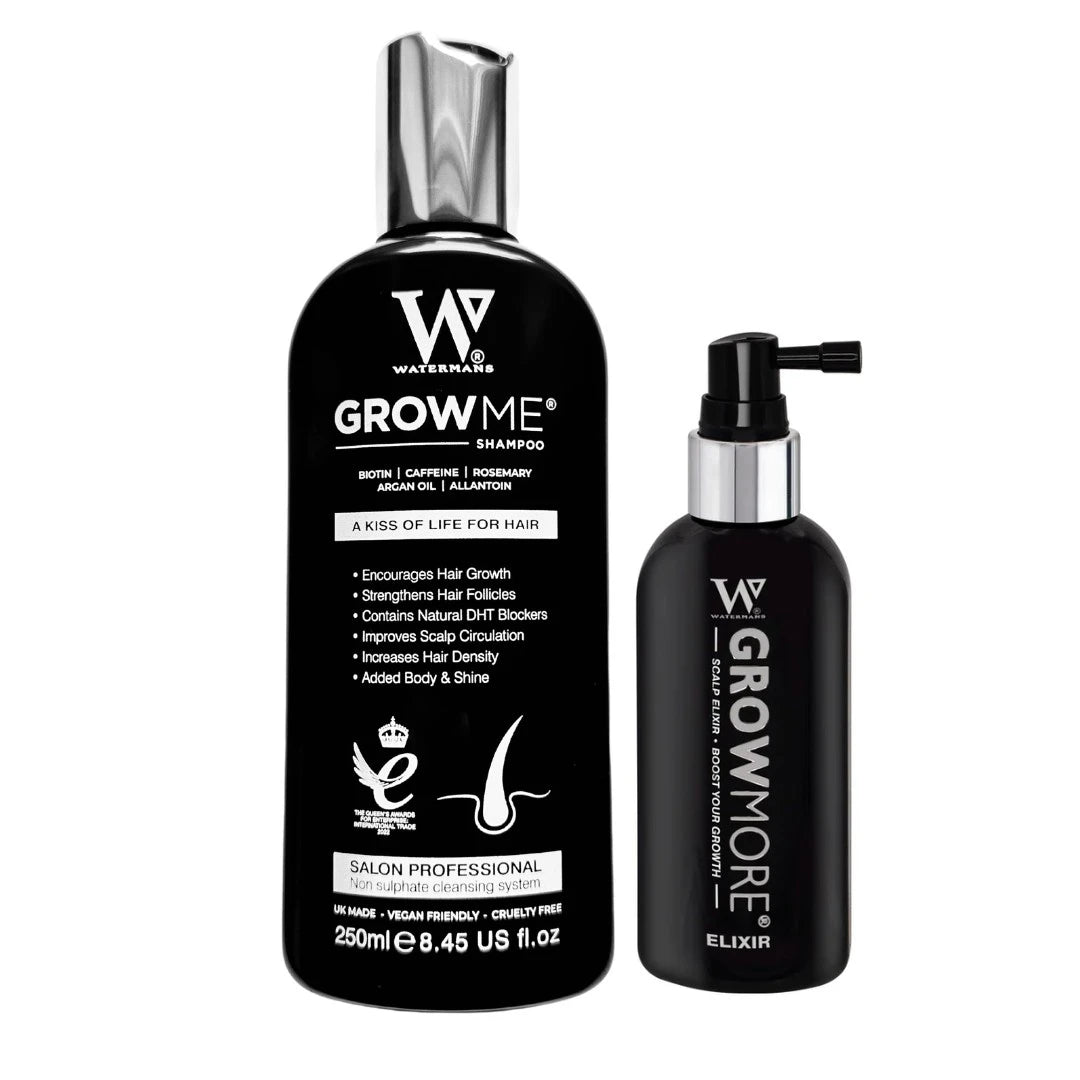
The Truth About Blocking DHT: Benefits, Risks, and What You Need to Know

Dihydrotestosterone (DHT) is a hormone. It affects many body processes and plays a key role in hair health. Many tie it to hair loss. Some people try to block it for both looks and well-being. This article looks at DHT. It shows the ups and downs of blocking it and gives tips on how to care for your hair well. If you worry about hair loss or want more volume, try Watermans Grow Me Shampoo. This natural shampoo works with good ingredients that help hair grow.
What is DHT?
DHT comes from testosterone. The enzyme 5-alpha-reductase makes it. It appears in many tissues like skin and hair follicles. It helps bring on male traits during puberty, like more body hair and a deeper voice. It may also lead to hair loss in some people.
The Link Between DHT and Hair Loss
DHT can trigger androgenetic alopecia, the most common type of hair loss. In people with a genetic tendency, DHT shrinks hair follicles. This shrinkage makes the hair shorter and thinner. This change is often named follicle miniaturization.
How Does DHT Cause Hair Loss?
When DHT joins with receptors in hair follicles, it sets off a clear chain reaction:
- Less Hair Growth: Follicles work slower when DHT is high. Hair becomes thin and may stop growing.
- Shorter Growth Cycles: Hair does not stay in the growth phase for long. This means it falls out sooner.
- More Hair Shedding: The hair that does appear is weak and may drop off with little stress.
Benefits of Blocking DHT
Blocking DHT can help in a number of ways:
1. Reduced Hair Loss
Blocking DHT may lower hair shedding. It can even bring some hair back for some people. If you face hair loss, checking options that lower DHT might help you keep or restore your hair.
2. Thicker Hair
Cutting down the effect of DHT can let hair follicles work better. This change can give you thicker strands. Thicker hair looks fuller and gives a healthier look.
3. Better Scalp Health
High DHT levels may inflame the scalp. Lowering DHT can calm the scalp. A calm scalp can support good hair growth.
4. Improved Confidence
Hair loss can hurt your feelings. When hair stays fuller, you may feel better about your looks. This change can help rebuild self-confidence.
Risks of Blocking DHT
Blocking DHT comes with risks:
1. Hormonal Imbalance
Blocking DHT can disturb your body’s hormones. This shift might bring:
- Lower sex drive
- Trouble with erections
- Breast growth in men
2. Side Effects from Medications
Many drugs used to lower DHT might cause side effects like:
- Mood changes
- Sadness
- Tiredness
- Allergic reactions
3. Uncertain Effectiveness
Blocking DHT may not work the same for all. Since your genes play a big role, some may not see the expected benefits.
4. Dependency on Treatments
Once you start a DHT blocker, you might need it to keep your gains. Stopping the treatment could quickly reverse the results.
Natural Ways to Support Hair Growth without Blocking DHT
You can care for your hair in a whole-body way. One good choice is Watermans Grow Me Shampoo. This natural shampoo has a mix of ingredients that help hair:
- Biotin: Helps hair grow.
- Rosemary: Boosts scalp blood flow.
- Caffeine: May wake up hair follicles.
- Niacinamide: Adds strength to hair.
- Argan Oil: Gives moisture and nourishment.
- Allantoin: Calms the scalp.
- Lupin Protein: Gives hair volume and shape.
A natural hair care plan supports your hair without the side effects that come from blocking DHT.
Q&A Section
Q1: What is DHT and why does it matter?
A1: DHT comes from testosterone. It shapes male traits and may cause hair loss in some people.
Q2: Can blocking DHT help with hair loss?
A2: Yes, it may reduce hair loss. Results depend on your genes and other factors.
Q3: Are there any side effects from blocking DHT?
A3: Yes, blocking DHT can trigger hormone shifts, lower drive, and affect mood.
Q4: What natural methods can I use?
A4: Using shampoos with vitamins and oils, like Watermans Grow Me Shampoo, helps your scalp and hair.
Q5: Does age affect DHT levels?
A5: Yes, DHT levels can change as you get older and may lead to hair loss.
Q6: Can diet affect DHT levels?
A6: Yes, a balanced diet with plenty of vitamins supports healthy hair.
Q7: How can I care for my scalp?
A7: Keep a simple hair care routine, use gentle products, and try supplements that help calm your scalp.
Q8: Is long-term use of DHT blockers safe?
A8: Long-term use might bring side effects. Speak with a doctor for advice.
Q9: Can stress change DHT levels?
A9: Yes, stress may change hormone levels, including DHT, and can lead to hair loss.
Q10: What should I do if I notice hair loss?
A10: Talk to a doctor. They can help find the cause and choose the best treatment, including natural paths like Watermans Grow Me Shampoo.
Did You Know?
- DHT and Prostate Health: High DHT levels are linked to prostate changes in men.
- DHT Affects Women Too: Women may lose hair from DHT, especially after menopause.
- Genes Matter: Your genes affect how DHT works in your body.
- Natural Helpers: Some foods, such as pumpkin seeds and green tea, might slow DHT naturally.
- Hair Grows in Cycles: Hair moves through stages of growth, rest, and shedding. Knowing this helps in caring for your hair.
Blocking DHT may seem like a way to handle hair loss, but it brings both benefits and risks. Using natural products like Watermans Grow Me Shampoo in your daily routine gives gentle support to your hair. Stick to natural and whole-body methods when caring for your hair and your health.













